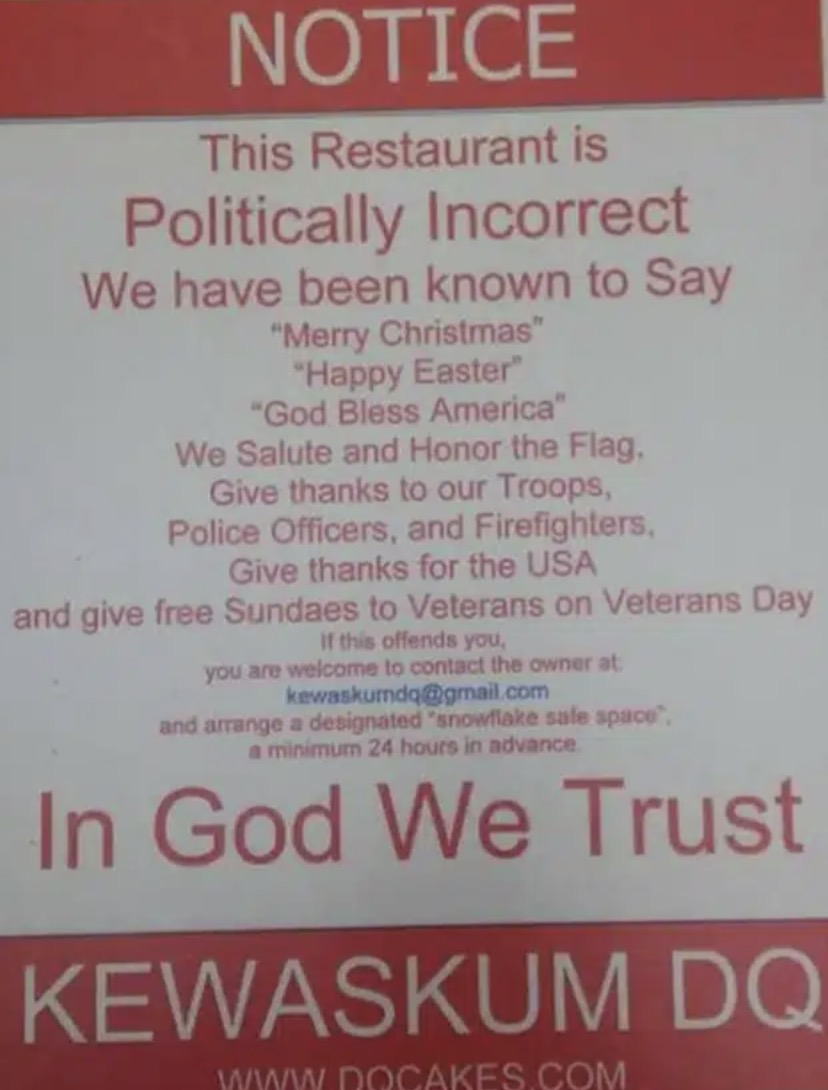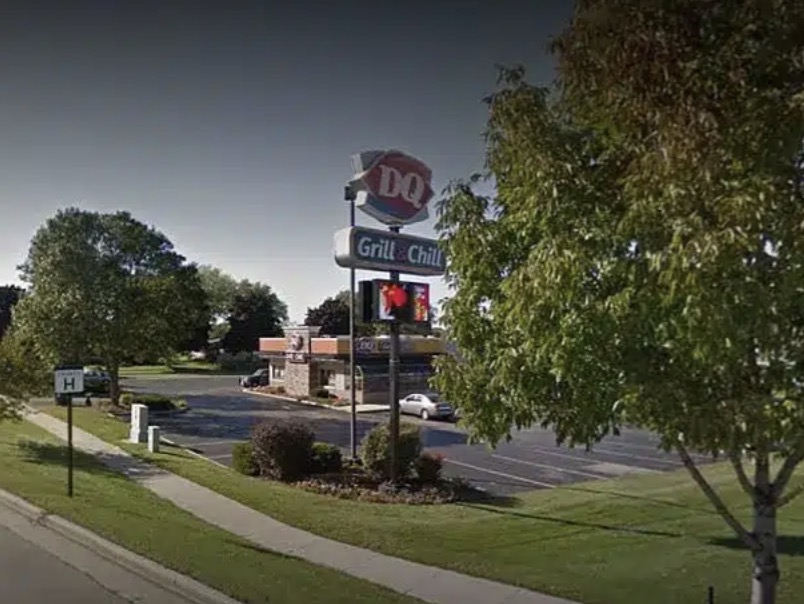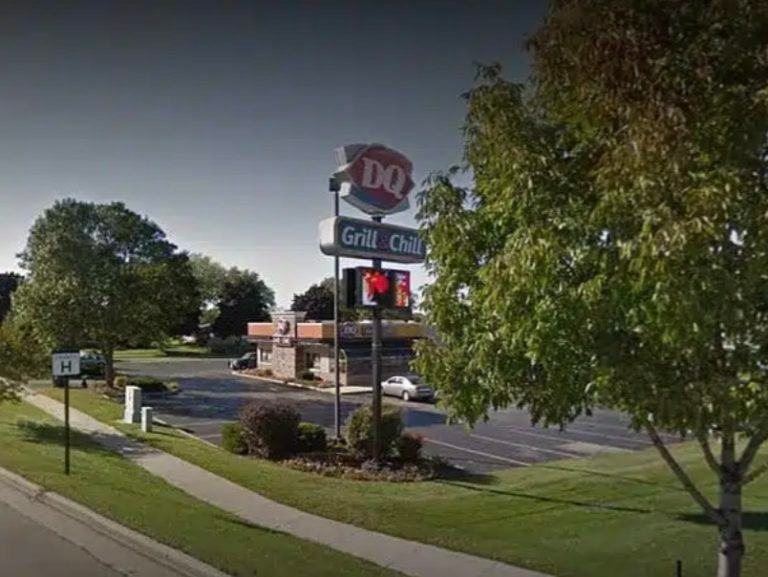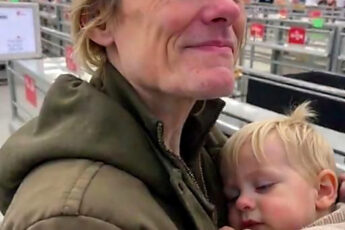In a small town in Wisconsin, a Dairy Queen in Kewaskum has recently found itself at the center of a heated online debate, all stemming from a message etched onto a billboard outside the restaurant. The handwritten sign, posted on a window, drew considerable attention after a tourist shared a picture of it on Facebook. What made it stand out wasn’t just the message itself but the controversy it ignited—people divided over what it represents and whether it crosses a line of social acceptance.
The sign is unapologetically bold. It openly declares the restaurant’s unapologetic support for traditional American values and Christian beliefs. It proudly displays phrases like “Merry Christmas,” “Happy Easter,” and “God Bless America,” words that most companies have, in recent years, tried to tone down or avoid altogether amid the cultural shifts and growing emphasis on inclusivity. The billboard also pays homage to the military, showing appreciation for those who serve and support the country, particularly on Veterans Day with a gesture of giving free sundaes and displaying the American flag, an act that many see as a simple tribute but which has spurred differing opinions online.

The owner of the Dairy Queen, Kevin Scheunemann, explained that the sign was put up nearly four years ago. His motivation? Transparency. “I wanted our customers to know where I stand,” he said in a recent interview. Scheunemann claims the message was also a response to a customer’s complaint about the Christian music being played in the restaurant. For him, it was a way to clarify that their commitment to the community also included their faith and love for the country. Since then, the sign has remained, untouched by controversy—or so he believed.
However, the recent spotlight came after an Oregonian tourist posted a picture of the sign on Facebook. They questioned whether the messages sent a tone of exclusivity or if they alienated non-Christians or those with different beliefs. The post quickly garnered hundreds of reactions, many supporting the restaurant’s right to express its beliefs, but others criticizing the sign for seeming to set a religious or political tone that might prevent some customers from feeling welcome. The post was later taken down, but by then, the damage was done. The story had gone viral, initially stirring debate and outrage but also inspiring a flurry of commentary that divided community lines.

Supporters of the sign emphasize the importance of freedom of speech and religious expression. They argue that Scheunemann’s sign is simply an honest reflection of his beliefs. “He’s being upfront about who he is,” a local business owner told me. “And if someone doesn’t like it, they’re free to leave or not support the place. That’s their right.” Many of the people living in the tiny village of Kewaskum see the sign at face value—as a personal statement from the owner, not a message designed to offend or exclude but to share his pride in his faith, his country, and his community.
Opponents, however, feel differently. They feel that such a bold sign might hurt the town’s reputation, especially as more people rely on online reviews and social media to choose where they eat. They argue that the message’s tone seems to suggest that those with different beliefs or backgrounds aren’t welcomed. That perception, some say, could reduce tourism and make visitors uncomfortable—especially in an era when inclusivity and respect for diversity are growing more important than ever.
The company behind Dairy Queen, which has franchise owners nationwide, issued a statement, reaffirming that the sign only reflects the proprietor’s personal beliefs. “We respect the rights of our franchisees and their personal expressions,” the statement read. “However, we also emphasize that all our stores are committed to treating every customer with dignity and respect, regardless of their background or beliefs.” The statement aims to dissociate the brand from the specific messages of any one franchise owner, emphasizing that personal beliefs don’t affect their core values of inclusion and respectful service.
In local gatherings, many residents seem to take the sign more lightly. To them, it’s just Kevin’s way of expressing himself. They recognize that small towns often have personalities just as vibrant and diverse as a big city—different opinions, different lifestyles, and different ways of celebrating the things that matter most to each person. Many read the sign as a simple declaration of faith and pride, agreed upon by a community that values its roots. They see no harm in it, only a reflection of their local pride.
Of course, controversy isn’t new to America’s cultural landscape. It’s a country built on differing opinions and the clash of ideas—some expressed openly, others more quietly. The debate here isn’t just about a sign in Kewaskum; it’s part of a larger conversation about freedom of expression, religious rights, community identity, and the boundaries of acceptance.
As the story continues to unfold, it prompts us all to reflect: How do we balance personal beliefs with respect for others? Where do we draw the line between sharing our values and inadvertently shutting others out? For now,




